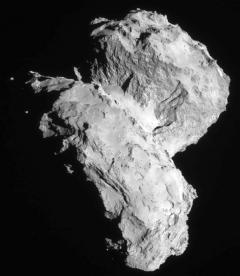Solar System
Solar System research at the IfA

The IfA's Solar System Group's research focuses on minor bodies such as comets and asteroids. These left-over building blocks can be used to trace the conditions and processes at the formation of our Solar System, and to better understand how planets form. Our work is primarily based on observation of minor bodies using a wide range of telescopes, but also includes exploration using robotic spacecraft.
We use telescopes (especially the UK telescopes at La Palma and the ESO facilities in Chile) to study: the composition of comets and asteroids; how cometary activity varies throughout the Solar System; the surface properties of icy bodies; the characteristics of spacecraft targets for mission planning and context. Edinburgh is a leading institute in the study of ice within the asteroid belt, and the so-called ‘main belt comets’, one of the most exciting areas of Solar System research in recent times.
A particular strength of Solar System research at Edinburgh is the combination of observations with in situ exploration using spacecraft. Group members are involved with the ESA Rosetta comet mission, the NASA Dart and ESA Hera asteroid deflection experiments, and a Chinese asteroid and main belt comet mission.
Jointly with UCL, we lead the recently selected ESA Comet Interceptor mission, which will be the first spacecraft to encounter a new comet entering the inner Solar System for the first time, and is due to launch in 2028.

